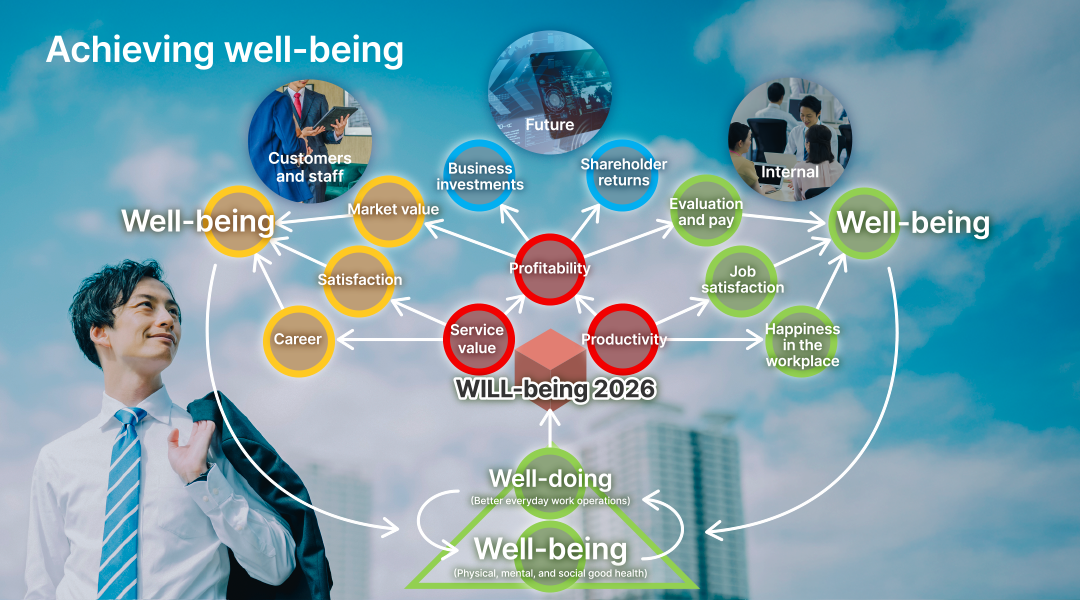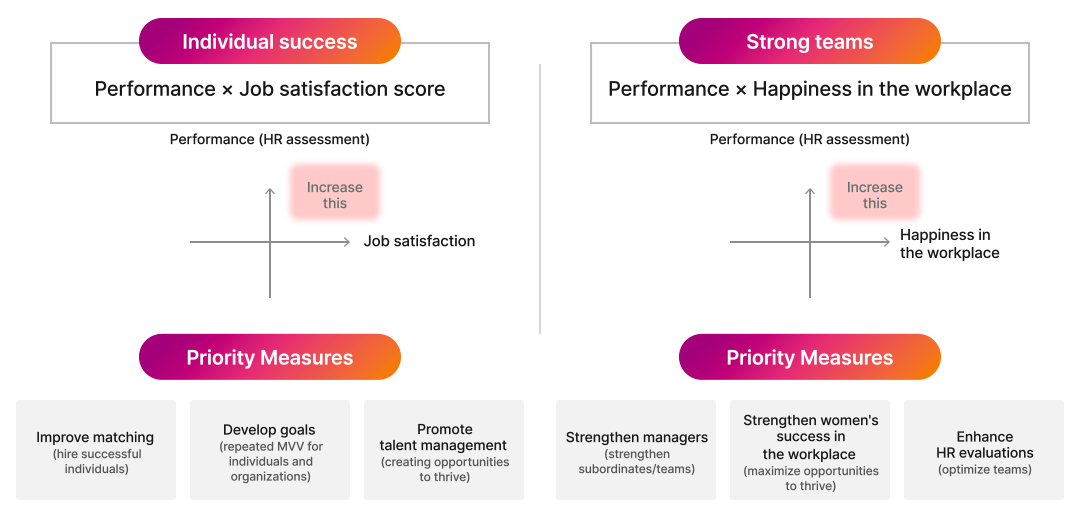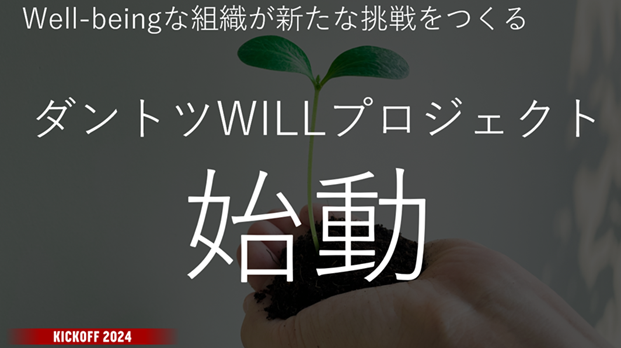Social (Domestic HR Strategy)
- TOP
- Sustainability Initiatives
- Social (Domestic HR Strategy)
-
Hiroshi Shimogama
WILL GROUP, INC.
General Manager, Human Resource Development Department -
Takahiro Katsuhara
WILL GROUP, INC.
General Manager, Planning and Labor Management Department -
Makiko Takahashi
WILL GROUP, INC.
Manager, Planning and Labor Management Department -
Shuhei Nakajima
WILL GROUP, INC.
Director, Human Resources Division
Achieving sustained growth rooted in well-being
The Human Resources Division has set “drawing out the potential of people and organizations” as one of the key themes of its human resources strategy as it works to achieve its mission and support business strategy. The company's overall mission of “bringing positive change to individuals and organizations” means to “achieve well-being (both physical and mental) for people, society, and the world as a whole.” We have positioned the well-being of individual employees at the starting line for all activities as we focus on creating a virtuous cycle of sustained growth.
This cycle begins with personnel's well-being. Improving well-being produces better daily work (well-doing) that then drives the business strategy. Steadily executing our strategy will lead to enhanced service value, better profitability, and better productivity, improve customer satisfaction and job satisfaction of temporary staff, and ultimately feed back into personnel well-being.
By continuously moving through this positive cycle, we aim to enhance the WILL GROUP’s competitive strength and corporate value in addition to achieving our company mission.

Good performance from individual success and strong teams
The WILL GROUP's biggest strengths are both our “successful individuals” and “strong teams.” Through analysis of surveys conducted across multiple years, we firmly believe that fully drawing out individual potential and enhancing the quality of team relationships will lead to better performance and well-being throughout the entire organization.
In order to encourage individuals to succeed, we look at employees’ unique talents and latent potential while focusing on building an environment that will cause that potential to bloom. Specifically, we provide support for individuals’ career development, provide various opportunities for skill improvement, and create opportunities to participate in challenging, ambitious projects. Through this, we have laid the foundation for every employee to seek out self-actualization while contributing to the organization. At the same time, we focus on building strong teams that aggregate these individuals’ combined strength to create bigger results. We work to cultivate a culture that respects diversity and draws effectively on our respective differences as strengths, promotes open and constructive communication, and builds relationships of trust between members.
This synergy between individual success and strong teams is the source of the WILL GROUP's competitive edge. While each member of the team acts on their individual strengths, their combined strength as a team is maximized as well, enabling them to flexibly adapt to changes in the market and create new value.

Further strengthen the human capital that has been a focus of ours since the company's founding
The WILL GROUP has experienced continuous growth over the years, but we have now entered a period of maturity. In orienting towards our new growth phase, we view bolstering human capital through DE&I and work style reforms as well as support for human capital development and skill development as a critical task facing management. The WILL GROUP has set various KPIs for bolstering human capital (see the Key Issues page), among them the “job satisfaction score” that indicates individual success and the “workplace happiness score” that indicates team strength. These scores are important tools for objectively measuring employees’ job satisfaction and the health of organizations that will lead to continuous improvement.
The “job satisfaction score” is a comprehensive measurement of factors including workplace comfort, job meaningfulness, feeling of growth, and self-actualization level. The “workplace happiness score” is a measurement of factors including team safety and peace of mind, the level of trust in relationships, and an environment that promotes challenging oneself. By regularly measuring and analyzing these scores, we clarify strengths and issues in promoting human capital management, which leads to more effective HR policy planning and implementation.
We also track changes in scores over time to assess the effectiveness of individual measures and continue the cycle of improvement. Through this, we are able to quantitatively monitor how much initiatives to strengthen human capital actually contribute to personnel engagement (sense of ownership with respect to the company, work, and coworkers) and revitalizing the organization. These findings are then utilized to make adjustments to strategy and implement new measures.
Moving forward, we will continue to create virtuous cycles rooted in personnel well-being, enhance synergies between individual success and strong teams, continue to create new value and growth, and draw out the full potential of people and organizations.
| FY2022 Results | FY2023 Results | FY2024 Results | FY2026 Targets | |
|---|---|---|---|---|
| Job satisfaction score | 51.2% | 52.9% | 57.0% | 62.5% |
| Workplace happiness score* | 68.4% | 69.2% | 69.6% | 69.6% |
*The workplace happiness score is the average of scores on four questions
Examples of Initiatives
Project promoting women's success at the workplace
In order to create positive change in the world, it is essential that a variety of individuals thrive without being held back by stereotypes created by society. In this area, we are especially focused on women and are implementing DE&I initiatives towards achieving a target of 30% female managers in Japan by 2030.
At present, around 60% of male employees are interested in upper management positions, but this is true of just 25% of female employees. Therefore, we are pursuing initiatives to select specific female personnel for special leadership training to develop their ambition and confidence so that they seek out their own style of leadership. We also have various other measures in place, and these combined initiatives have succeeded in increasing the percentage of female managers in Japan from 7.4% to 16.1% over the last four years. Moving forward, we will continue to bolster DE&I initiatives to achieve success among a variety of different individuals.
| FY2022 Results | FY2023 Results | FY2024 Results | FY2026 Targets | ||
|---|---|---|---|---|---|
| Percentage of female managers in Japan | 13.5% | 14.9% | 16.1% | 22.0% | |
| Percentage interested in management positions | Men | 65.8% | 63.2% | 63.1% | - |
| Women | 22.4% | 24.8% | 24.7% | 36.0% | |
Dantotsu WILL Project
This is a Group-wide project focused on creating internal frameworks and opportunities to “boost job satisfaction to the very peak by enhancing employees’ work, play, learning, and lives to the very peak.” In the past, the same sort of initiative was conducted for top management at business divisions, but in the pure interest of wanting managers and executives and employees all involved in improving job satisfaction at the WILL GROUP, the Dantotsu WILL Project was created in FY2025. As is characteristic of the WILL GROUP, participants are all volunteers and form a cross-company team that includes everything from new university graduates to company directors.
On their own initiative and through their own action, project members strive to build an organization where job satisfaction is high. Through ambitious new initiatives crossing the boundaries of job and business division, we will continue engaging in these projects to enhance job satisfaction at the company.


